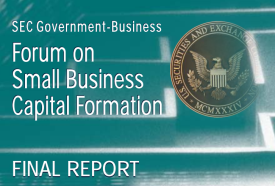 After only seven (7) months the “SEC Government-Business Forum on Small Business Capital Formation” recently released its final report from its November 21, 2013 meeting. Despite what seems like an unnecessarily long wait, the report holds some very solid recommendations regarding crowdfunding and crowdfunding regulations.
After only seven (7) months the “SEC Government-Business Forum on Small Business Capital Formation” recently released its final report from its November 21, 2013 meeting. Despite what seems like an unnecessarily long wait, the report holds some very solid recommendations regarding crowdfunding and crowdfunding regulations.
For those that do not know, since 1982 the Securities and Exchange Commission (SEC) has hosted an annual forum focusing on the capital formation concerns of small businesses. The forum provides a platform for participants to identify and discuss current impediments in the small business capital market and to formulate recommendations for overcoming them.
Last year’s forum was particularly interesting given the number and diversity of entrepreneurs and advocates who attended to voice their opinions regarding the various provisions of the JOBS Act. If one theme is clear from the final report, it’s that the attendees felt that the “impediments” to the usefulness of the JOBS Act was coming from the overregulation of the Act by the SEC themselves.
The crux of the final report spans about eight (8) pages and sets forth forty-three (43) separate recommendations (some in multiple parts). The recommendations are presented in the order of perceived importance by the forum attendees and without going into detail on each recommendation, I believe some of them deserve particular highlighting:
- Recommendation #1 - We recommend that the Commission withdraw its proposed amendments to Regulation D, Form D and Rule 156. If the Commission determines not to do so, then we urge that revised proposals be published for further comment to include the following: … Clarify the meaning of “general solicitation,” and confirm that longstanding economic development events, such as “demo days,” do not constitute general solicitation.
- Recommendation #2 - Because Rule 506(c) exempt offerings exclude non-accredited friends and family investors, who have traditionally been important participants in small business capital formation, we recommend that the Commission: (i) Maintain the ability of Rule 506(c) issuers to concurrently offer Section 4(a)(6) crowdfunding securities, as set forth in the proposed rules issued pursuant to the JOBS Act; and (ii) Clarify that an issuer changing from a Rule 506(b) offering to a Rule 506(c) offering may sell to friends and family and other non-accredited investors in a parallel Section 4(a)(6) crowdfunding offering.
- Recommendation #3 - We recommend that the Commission not increase the dollar amount thresholds in the accredited investor definition following its review of the definition, as mandated by the Dodd-Frank Act … At the same time, we recommend that the Commission consider additional separate categories of qualification for accredited investors based on various types of sophistication, for example, by virtue of education, experience or training.
- Recommendation #5 - The Commission should provide clarification and a framework on what is considered investment advice for a crowdfunding portal. Portals should be able to provide a labeling mechanism, such as an issue is “hot” or “trending,” along with an advanced search feature.
- Recommendation #9 - Eliminate the imposition of liability against a crowdfunding platform for the misstatements and omissions of the companies that post on the platform’s website.
- Recommendation #15A - Allow crowdfunding intermediaries to syndicate deals between platforms by having one lead intermediary host and provide a communication channel to the other funding portals and allow funding portals to share commissions and fees. Transactions must be conducted on the intermediary platform on which they originated.
- Recommendation #19B - Standardize baseline educational material across crowdfunding portals in order to establish an industry standard similar to the Real Estate Settlement Procedure Act (“RESPA”) administered by the Consumer Financial Protection Bureau (“CFPB”) for the mortgage industry.
- Recommendation #24 - Crowdfunding platforms of foreign entities should be allowed to conduct business as a U.S. crowdfunding portal only if the foreign entity forms a partnership with a U.S. crowdfunding portal.
- Recommendation #25 - Allow crowdfunding intermediaries the ability to monitor misstatements on crowdfunding platforms, monitor Q&A commentary and de-rank accordingly as a filtering mechanism. Allow crowdfunding intermediaries the ability to curate based on less objective factors, such as management team experience, over-inflated financials, or size of funding requested, if the funding request is too little to realistically achieve business goals.
- Recommendation #31 - Given the dwindling number of market-makers willing to submit FINRA Form 211 for trading the shares of smaller publicly reporting companies on the over-the counter market, the SEC’s Division of Trading and Markets should encourage FINRA to allow payment by an issuer of a fixed fee to a market-maker to compensate the market-maker for its time and effort involved in required due diligence, form preparation and related expenses.
- Recommendation #38A - Standardize deal structures across crowdfunding platforms.
The above recommendations, as well as many others presented in the final report, echo the sentiments that many of us in the crowdfunding industry have held for some time. Whether the SEC will ultimately choose to act on any of these recommendations or simply file this report away with the numerous public and private sector comment letters it has received since the enactment of the JOBS Act remains to be seen. What is clear is that reports like this are necessary in order to keep the SEC’s eye on the ball and remind them that the JOBS Act was intended to improve small business capital formation, not to impede it by overregulation.
file this report away with the numerous public and private sector comment letters it has received since the enactment of the JOBS Act remains to be seen. What is clear is that reports like this are necessary in order to keep the SEC’s eye on the ball and remind them that the JOBS Act was intended to improve small business capital formation, not to impede it by overregulation.


Anthony, great post on the dilemma that has become the SEC dragging its feet on the Title lll Regulations and the innovative strategies various states are taking to pick up the fumbled football and run with it.
Pingback: DIRECTOR KEITH HIGGINS’ TESTIMONY ON CURRENT STATUS OF JOBS ACT RULEMAKING AND OTHER TOPICS LEADS TO SPIRITED Q&A | CROWDFUNDINGLEGALHUB.com